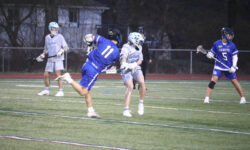[ccfic caption-text format="plaintext"]
By Katrina Margolis
Hometown Weekly Reporter
William Johnson is a junior at Medfield High School. He’s working hard to get through his classes, tackling such beasts as AP US History, while at the same time working with the basketball team, playing soccer, and applying to and checking out colleges. His mother will tell you that his first college interview is coming soon - both an exciting and nerve-racking event.
William is just like any other high school student, except for one thing – he has been in a wheelchair since age two due to spinal muscular atrophy (SMA).
Diagnosed with Type 2 SMA as an infant, William has been in a stable place for a number of years. However, after years of fundraising, research, and campaigning, the Johnsons have found out that the first drug to treat SMA has been approved by the FDA.
Heidi, William’s mother, explained what exactly this drug can do. “Basically there’s a protein he’s missing in his body that supports the health of the motoneurons in his spine. The motoneurons are shooting the messages through the muscles. Because he’s missing the protein, those motoneurons start dying, and so he’s got less messaging going on through his spinal center,” she said. “They told me that having SMA means that when his brain is shouting to do something to a part of his body, you and I can shout the message and we’ll quickly do it; but through his damaged message center, it’s like whispering, so he just doesn’t get the messages. From there, he gets weaker and weaker because he’s not doing the things, so he atrophies from there.”
A form of muscular dystrophy, SMA is closely related to ALS.
Spinraza, the newly-approved drug, has the capabilities to improve the messages William’s spine is sending to the rest of his body. “He’s missing this protein, but he has a ‘backup copy,’ and the backup copies sort of create the protein. But the protein he creates is flawed, and so that flawed protein is trying to support the health of all of his motoneurons. It’s doing the best it can, but there is a lack of stuff like we have,” Heidi explained. “So Spinraza goes into the spine and works with the backup copies to correct the flawed protein and turn it into a more viable protein which will support better health of the motoneurons.”
Trials have been on mostly younger children than William, but with exceptional results. One child diagnosed with Type 1 SMA from birth has yet to develop symptoms three and a half years later. Of course, the outcome Heidi and William expect is much different than this.
“We don’t expect to walk, we don’t expect to play football,” Heidi said. “We would love him to open his own zip lock bag. We would love for him to zip his own coat, or be able to press the elevator button, or even the handicapped 'door open' buttons that are placed too high or are hard to press, because they are installed for him! That’s our goal. If he could get 20 percent stronger, that would be amazing.”
As a junior, William is in the process of looking at colleges. His older brother and sister both attended Colby, which is also the alma mater of his mother and father. His upcoming interview was also at Colby.
When considering their college choices, most kids are able to simply weigh whether they'll be accepted, if they like the campus, and if they “fit in” best there. For William, there are a number of things to consider that go far beyond the “feel” of a college.
“Is there access to the academic buildings? Is there place he can live? Is it going to be fun enough or is he going to be isolated? Will be miss the social aspects if he’s shut out?” Heidi wonders. “So we have to figure all of those things out. It’s been interesting figuring that out. And from a health standpoint, what it puts at risk the most is his lungs.”
Despite all of these challenges looking forward, William has excelled throughout high school. Adam Coyle, William’s AP US History teacher, said, “The course itself is incredibly fast-paced, while at the same time being almost encyclopedic in its coverage of the entirety of American history. William has responded to the challenge admirably. He is a great self-advocate. He is a frequent participant in class discussions where his insights, questions, and ability to make connections between concepts raises the bar for the rest of the class.”
Despite his physical disabilities, William has even been involved with the school’s sports programs. The boys varsity soccer coach, Jason Heim, has had William involved for years. “William has been a manager since he was a freshman,” he explained. “He comes to practices, tryouts, games and other events. He keeps digital statistics and sends them to me after every game.”
William plays soccer himself on a very competitive team. In order to better understand the physicality of what William does, Heim had the varsity team experience power soccer as William does. “They all had a new respect for William's ability. The day was amazing and I even had a chance to participate.”
“Aside from the obvious and tremendous physical challenges that William deals with and overcomes on a daily basis," Coyle added, "he is no different from other teenagers in every other respect. The fact the he deals with such incredible challenges daily, and does so with positivity and almost fearlessness leaves me in awe.”
Much of this has been aided by the Medfield community. Over the past 16 years, Heidi guesses that her family has raised hundreds of thousands of dollars through their walkathons, golf tournaments, and many other fundraisers. “The community as a whole deserves a thank-you … they just have been so kind to follow his health and send good wishes his way all the time,” she said.
The most recent news is that due to a spinal fusion William received a number of years ago, he is not an immediate candidate for Spinraza. However, he is a delayed candidate. At the moment, no one in the state of Massachusetts is receiving the drug. Approved nearly four months ahead of schedule, Children’s Hospital is still dealing with the logistics and specifics of giving treatment.
“We feel so blessed. We don’t wish this disease on anyone, but the thought that maybe no one has to be what we were 17 years ago when we were in the room…” Overwhelmed with emotion, Heidi simply shakes her head, and breathes a sigh of relief.
“It’s going to be a battle, but it’s a battle worth fighting. And hopefully in the end, he can be stronger and he can kick my butt.”









